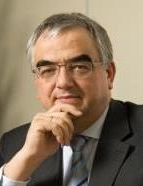Big Pharma never lost the black eye it earned over the years for neglecting the diseases of poor countries as the industry catered largely to the needs of the developed world. But some of its biggest players are trying.
Now Johnson & Johnson ($JNJ) has carved out a new R&D group called Janssen Global Public Health, which will take the lead in developing and distributing a portfolio of therapies that are being developed primarily for poor countries. And it will bring together a variety of initiatives with non-profit organizations which have been pushing hard to gain a bigger investment from the pharma majors.
The portfolio includes a long-acting version of the HIV drug rilpivirine, brought in through a licensing deal with PATH. J&J is working with the not-for-profit Drugs for Neglected Diseases initiative on a preclinical effort to reformulate flubendazole to guard against parasites. And there's a program underway to increase access to Sirturo for drug-resistant cases of tuberculosis.
 |
| Paul Stoffels |
Adrian Thomas, VP for global market access, commercial strategy and public health, and Wim Parys, head of R&D global public health, will jointly lead Janssen GPH.
The move may enhance J&J's rep, but plenty of companies still find themselves in the crosshairs of critics angry over the industry's focus on profits. Recently, Bayer CEO Marijn Dekkers told Bloomberg that "we did not develop this medicine (Nexavar) for Indians. We developed it for western patients who can afford it." Dekkers was commenting on India's move to force the release of a generic version of Nexavar at a fraction of the drug's retail cost.
Doctors Without Borders quickly reacted: "This statement sums up, in one sentence, everything that is wrong with the R&D system today; that R&D can only be rewarded by a patent and through high prices to recoup the R&D costs, and that those who can't afford to pay are basically cut out of the system, and that if diseases aren't profitable enough, there will be no R&D investments and no new drugs."
That's the kind of controversy that J&J wants to steer clear of.
"To solve today's greatest public health challenges, it's essential that we emphasize the needs of the developing world in equal measure to those of the developed world," J&J chief scientist Paul Stoffels said in a statement. "With this new group, we've adopted a more focused approach to further develop and introduce our most promising medicines, and with other like-minded organizations, we look forward to advancing a sustainable platform that will make a significant impact on the lives of people around the world."
J&J's effort to repurpose or expand access to drugs isn't going to resolve the debate over Big Pharma's engagement in the developing world. But the company has been singled out by the Access to Medicines Index, which placed J&J in the top three companies looking to improve pricing and increase R&D efforts on neglected diseases. GlaxoSmithKline ($GSK) came in No. 1 for 2012 and J&J was followed by Sanofi ($SNY), Merck ($MRK) and Gilead ($GILD).
- here's the release